June 19, 2023
Conferences
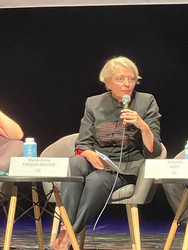
♾️ follow Marie-Anne Frison-Roche sur LinkedIn
♾️subscribe to the Newsletter MAFR Regulation, Compliance, Law
____
► Full Reference: M.-A. Frison-Roche, participation in the panel "Vigilance (due diligence)", in International Law Association (ILA), 150th Anniversary Symposium of the ILA/ADI, Paris, 19 June 2023.
____
🧮See the full programme of this event
________
Updated: Feb. 2, 2023 (Initial publication: March 31, 2021)
Thesaurus : Doctrine

► Full Reference: E. Silva-Romero and R. Legru, "Quelle place pour la Compliance dans l'arbitrage d'investissement ?" ("What place for Compliance in investment arbitration?"), in M.-A. Frison-Roche (dir.), La juridictionnalisation de la Compliance, coll. "Régulations & Compliance", Journal of Regulation & Compliance (JoRC) and Dalloz, 2023, p. 281-293.
____
📕read a general presentation of the book, La juridictionnalisation de la Compliance, in which this article is published
____
► The summary below describes an article that follows an intervention in the scientific manifestation Compliance et Arbitrage, co-organised by the Journal of Regulation & Compliance (JoRC) and the University Panthéon-Assas (Paris II). This conference was designed by Marie-Anne Frison-Roche and Jean-Baptiste Racine, scientific co-directors, and took place in Paris II University on March 31, 2021.
In the book, the article will be published in Title II, devoted to: Compliance et Arbitrage.
____
► Summary of the article (done by the Journal of Regulation & Compliance): The authors emphasize the new and growing place of Compliance in International Arbitration, particularly in the requirement of respect for ethical values, since arbitrators can implement Ethics, sometimes lacking in international trade, or even must put their power only at the service of investors who respect the Rule of Law.
Thus, Compliance is deployed through the classic control by the arbitrators of the legality of the investment, which applies both to the establishment of the treaty itself and to the investor. In a more recent way, the arbitrator can control about an investment project a sort of "social license to operate" of the investor, concept related to the social responsibility of the companies, appeared for the protection of the peoples indigenous. Moreover, Compliance can justify a substantial assessment by the arbitrator of the effective respect of the human rights and the environment protection via an investment treaty, the State party remaining able to act for the effectiveness of these concerns.
________
Updated: Feb. 2, 2023 (Initial publication: March 31, 2021)
Thesaurus : Doctrine

► Full Reference: C. Kessedjian, "L'arbitrage au service de la lutte contre la violation des droits de la personne humaine par les entreprises" ("Arbitration in the service of the fight against the violation of human rights by companies"), in M.-A. Frison-Roche (ed.), La juridictionnalisation de la Compliance, coll. "Régulations & Compliance", Journal of Regulation & Compliance (JoRC) and Dalloz, 2023, p. 295-302.
____
📕read a general presentation of the book, La juridictionnalisation de la Compliance, in which this article is published
____
► Summary of the article (done par the author): By choosing the expression "Human Rights violations by Businesses", the Author is taking sides among the many possible titles for her article, that could portrait the field of law we are talking about here. Often acronyms are used: RBC (responsible business conduct), CSR (corporate social responsibility), ESG (environment, social and governance), to name only the three main ones.
Her preference would be to use RBC by far, as CSR has been discredited by many NGOs and ESG has too much of a "financial" connotation.
In any case, this article deals with the attitude of enterprises that, in the conduct of their activities, cause damage to stakeholders, whether "internal" (employees, customers, partners, subcontractors, etc.) or external (local civil society, communities in which the activity takes place, the environment, etc.).
Legally, each of these cases may be characterized differently and generate the application of different procedural and substantive rules. When these disputes are submitted to arbitrators, many questions arise, the most delicate of which relate to the delimitation of the power of the arbitral tribunal, particularly if one starts from the idea that compliance aims at a proactive attitude on the part of enterprises with a clear preventive purpose.
The objective of prevention will lead to changes in the conduct of the arbitration that, for example, cannot remain confidential, confidentiality being an obstacle to the preventive effect of the decision rendered.
________
Updated: Feb. 2, 2023 (Initial publication: March 31, 2021)
Thesaurus : Doctrine

► Full Reference: F.-X. Train, "Arbitrage et procédures parallèles exercées au titre de la compliance" ("Arbitration and parallel proceedings exercised in Compliance Procedure"), in M.-A. Frison-Roche (ed.), La juridictionnalisation de la Compliance, coll. "Régulations & Compliance", Journal of Regulation & Compliance (JoRC) and Dalloz, 2023, p. 355-368.
____
📕read a general presentation of the book, La juridictionnalisation de la Compliance, in which this article is published
____
► The summary below describes the article that follows an intervention in the scientific manifestation Compliance et Arbitrage, co-organised by the Journal of Regulation & Compliance (JoRC) and the University Panthéon-Assas (Paris II). This conference was designed by Marie-Anne Frison-Roche and Jean-Baptiste Racine, scientific co-directors, and took place in Paris II University on March 31, 2021.
In the book, the article will be published in the Chapter III, devoted to: Compliance et Arbitrage international.
____
► Summary of the article (done by the Journal of Regulation & Compliance): Firstly, the article insists on the principle of the autonomy of the international arbitration procedure, in relation to which parallel procedures remain watertight, whether they are criminal or done under Compliance Law. In the arbitral proceedings taking place independently, the arbitrators before whom the facts also referred to in these parallel proceedings, in particular the facts of corruption, are alleged before them as facts through their unlawful nature: it is at this title that they can and must apprehend them, using the standard of proof which is the bundle of clues.
Secondly, the article highlights the limits of the autonomy of international arbitration. These may be de facto limits because in the search for evidence by arbitrators, red flags are often insufficiently consistent evidence to establish a sentence, especially since this sentence may be subject to control by the judge of its conformity to international public order, the annulment by the judge being able to be based on external elements, even after the arbitration procedure. It may then be wise for the arbitrators, who are not forced to do so, to suspend their proceedings to wait the results of the parallel proceedings initiated under Compliance Law, so that the procedures and their results could be harmonious.
________
Feb. 2, 2023
Publications
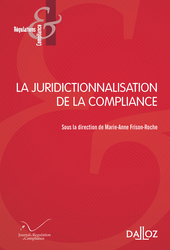
🌐 follow Marie-Anne Frison-Roche on LinkedIn
🌐 subscribe to the Newsletter MAFR Regulation, Compliance, Law
____
► Full Reference: M.-A. Frison-Roche (ed.), La juridictionnalisation de la Compliance, série "Régulations & Compliance", Journal of Regulation & Compliance (JoRC) and Dalloz, 2023, 490 p.
____
► Presentation of this book: Sanctions, controls, appeals, deals: judges and lawyers are everywhere in the Compliance mechanisms, creating unprecedented situations, sometimes without a solution yet available. Even though Compliance was designed to avoid the judge and produce security by avoiding conflict. This jurisdictionalisation is therefore new. Forcing companies to prosecute and judge, a constrained role, perhaps against their nature. Leading to the adaptation of major procedural principles, with difficulty. Confronting arbitration with new perspectives. Putting the judge at heart, in mechanisms designed so that he is not there. How in practice to organize these opposites and anticipate the solutions? This is the challenge taken up by this book.
____
📘 In parallel, the English version of this book, Compliance Jurisdictionalisation, is published in the series co-published by the Journal of Regulation & Compliance (JoRC) and Bruylant.
____
🧮 This book comes after a cycle of colloquia organised in 2021 by the Journal of Regulation & Compliance (JoRC) and its Academic Partners.
____
This volume is the continuation of the books dedicated to Compliance in the collection "Régulations & Compliance", founded and managed by Marie-Anne Frison-Roche, copublished by the Journal of Regulation & Compliance (JoRC) and Dalloz.
___
🏗️ General construction of this book:
The book begins by a double Introduction, the first (in free access) summarizing the book, the second, substantial, relating to the need to reinforce the Judge and the Lawyer to impose the Compliance Law as a characteristic of the Rule of Law.
The first Part is devoted to what is specific to Compliance Law. of Compliance: the transformation of companies into Prosecutors and Judges of themselves, even of others.
The second Part relates to Compliance general procedural Law, the procedure being the way between the dispute and the judgement.
The third Part continues this journey to the judge and aims to measure the influence of the reasoning and requirements of Compliance Law in dispute resolution methods where it was not, with some exceptions, present, but where it has a great future: Arbitration.
Because trial and judicial decision are inseparable, because legal techniques and the Rule of Law should not be divided but compliance techniques could paradoxically be the weapon of their dissociation, because the power to judge and the procedures surrounding the latter must not be dissociated, because therefore Compliance mechanisms and the Rule of Law must be thought out and practiced then, the rise in power of one must be the sign of the rise in power of the other, and not the price of the 'weakening of the Rule of Law, the fourth Part relates to the Judges in the Compliance mechanisms and culture.
____
► Read in free access the article: M.A. Frison-Roche, "Lignes de force de l'ouvrage La Juridictionnalisation de la Compliance" (Lines of Forces of the book La juridictionnalisation de la Compliance).
____
►Read below the summaries of each contribution of the book⤵️
Updated: Feb. 2, 2023 (Initial publication: March 31, 2021)
Thesaurus : Doctrine
► Full Reference: M. Audit, "La position de l'arbitre en matière de compliance" ("The position of the arbitrator in matters of compliance"), in M.-A. Frison-Roche (ed.), La juridictionnalisation de la Compliance, coll. "Régulations & Compliance", Journal of Regulation & Compliance (JoRC) and Dalloz, 2023, p. 303-315.
____
📕read a general presentation of the book, La juridictionnalisation de la Compliance, in which this article is published
____
► The summary below describes an article that follows an intervention in the scientific manifestation Compliance et Arbitrage, co-organised by the Journal of Regulation & Compliance (JoRC) and the University Panthéon-Assas (Paris II). This conference was designed by Marie-Anne Frison-Roche and Jean-Baptiste Racine, scientific co-directors, and took place in Paris II University on March 31, 2021.
In the book, the article will be published in its Title III, devoted to: Compliance et Arbitrage.
____
► Summary of the article (done by the Journal of Regulation & Compliance): For the arbitrator to intervene in matters of Compliance, a "Compliance Obligation" must exist. The identification of this specific obligation is tricky because it cannot generally be identified per se, if it is grasped only through Criminal Law, which does not enter directly into the field of Arbitration, which has developed an autonomous conception of the facts, in particular facts of corruption, which are also criminally reproachable. But because the obligation of compliance is itself autonomous, since it is a question of detecting and preventing various offenses and breaches, the arbitrators rely on the detection and prevention mechanisms as such, distinct from the possible behaviors that the Law wants they don't happen.
But the question of the source of this compliance obligation is central because it must arise from a standard that can lead to Arbitration. This is the case of the contract, for example an intermediary contract which not only prohibits any corrupt practice but also provides for audit or control, or even the case of national laws, in particular the UK Bribery Act or the so-called French "Sapin 2" law, or even decisions imposing compliance programs or the unconstrained adoption of these by the company. According to its source, the arbitrator will take the Compliance obligation into account.
If a Compliance obligation, having a source giving its significance in an Arbitration proceeding, is considered by the arbitrator to be breached, the consequences often depend on this source. The solution is classic if it is the lex contractus, more difficult if it is a Law which has inserted this obligation in the lex societatis, the requirements of compliance being generally considered as mandatory laws. If the arbitrators cannot apply the sanctions attached by the repressive law, they can support their decision in consideration of the breach found to assess the legality of a behavior or the validity of a contract, the ICC Rules for combating corruption being able to serve them as an analysis guide.
________
Updated: Feb. 2, 2023 (Initial publication: March 31, 2021)
Thesaurus : Doctrine

► Full Reference: J.-B. Racine, "Compliance et Arbitrage. Essai de problématisation" ("Compliance and Arbitration : Problematisation", in M.-A. Frison-Roche (ed.), La juridictionnalisation de la Compliance, coll. "Régulations & Compliance", Journal of Regulation & Compliance (JoRC) and Dalloz, 2023, p. 265-279.
____
📕read a general presentation of the book, La juridictionnalisation de la Compliance, in which this article is published
____
► The summary below describes an article that follows an intervention in the scientific manifestation Compliance et Arbitrage, co-organised by the Journal of Regulation & Compliance (JoRC) and the University Panthéon-Assas (Paris II). This conference was designed by Marie-Anne Frison-Roche and Jean-Baptiste Racine, scientific co-directors, and took place in Paris II University on March 31, 2021.
In the book, the article will be published in Title II, devoted to: Compliance et Arbitrage.
____
► Summary of the article (done by the author): Under the consideration of the "Compliance Juridictionalisation", it is necessary to study in the links between Compliance and Arbitration. The arbitrator is a judge, he is even the natural judge of international trade. Arbitration is therefore naturally intended to meet compliance which transforms the action of companies in an international context. However, the links between compliance and arbitration are not obvious. It is not a question of providing firm and definitive answers, but rather, and above all, of asking questions. We are at the start of reflection on this topic, which explains why there is, for the time being, little legal literature on the subject of the relationship between Compliance and Arbitration. It doesn't mean there aren't connections. Quite simply, these relations may not have come to light, or they are in the making. We should research the existing or potential bridges between two worlds that have long gravitated separately: Compliance on the one hand, Arbitration on the other. The central question is: is or can the arbitrator be a compliance judge, and, if so, how?
In any event, the Arbitrator is thus in contact with matters requiring the methods, tools and logic of Compliance. In addition to the prevention and suppression of corruption, three examples can be given.
- Arbitration has been facing economic sanctions (notably embargoes) for several years. The link with Compliance is obvious, insofar as texts providing for economic sanctions are often accompanied by compliance mechanisms, as in the United States. The arbitrator is concerned as to the fate he reserves in the treatment of the dispute with the measures of economic sanctions.
- Competition Law is a branch that came into contact with Arbitration from the end of the 1980s. The arbitrability of this type of dispute is now established and arbitrators apply it regularly. At the same time, Compliance has also entered Competition Law, admittedly more strongly in the United States than in France. The existence, absence or insufficiency of a compliance program aimed at preventing violations of the competition rules are thus circumstances which may assist the arbitrator in the assessment of anti-competitive behavior.
- Environmental Law is also concerned. There is environmental Compliance, for example with regard to the French law of March 27, 2017 on the duty of vigilance. Companies are thus responsible for participating in the protection of the environment, by internalizing these concerns in their internal and external operations (in their sphere of influence). As soon as an arbitrator is in charge for settling a dispute relating to Environmental Law, the question of the relationship to Compliance, from this angle, naturally arises.
It is therefore the multiple interactions between Compliance and Arbitration, actual or potential, which are thus open.
________
Oct. 20, 2022
Thesaurus : Doctrine

► Full Reference: F.-X. Train, "Arbitration and parallel proceedings exercised in Compliance Procedure", in M.-A. Frison-Roche, M.-A. (ed.), Compliance Jurisdictionalisation, series "Compliance & Regulation", Journal of Regulation & Compliance (JoRC) and Bruylant, to be published.
___
► the summary below describes the article that follows an intervention in the scientific manifestation Compliance et Arbitrage, co-organised by the Journal of Regulation & Compliance (JoRC) and the University Panthéon-Assas (Paris II). This conference was designed by Marie-Anne Frison-Roche and Jean-Baptiste Racine, scientific co-directors, and took place in Paris II University on March 31, 2021.
In the book, the article will be published in the Chapter III, devoted to: Compliance et Arbitrage international.
___
► Article Summary: Firstly, the article insists on the principle of the autonomy of the international arbitration procedure, in relation to which parallel procedures remain watertight, whether they are criminal or done under Compliance Law. In the arbitral proceedings taking place independently, the arbitrators before whom the facts also referred to in these parallel proceedings, in particular the facts of corruption, are alleged before them as facts through their unlawful nature: it is at this title that they can and must apprehend them, using the standard of proof which is the bundle of clues.
Secondly, the article highlights the limits of the autonomy of international arbitration. These may be de facto limits because in the search for evidence by arbitrators, red flags are often insufficiently consistent evidence to establish a sentence, especially since this sentence may be subject to control by the judge of its conformity to international public order, the annulment by the judge being able to be based on external elements, even after the arbitration procedure. It may then be wise for the arbitrators, who are not forced to do so, to suspend their proceedings to wait the results of the parallel proceedings initiated under Compliance Law, so that the procedures and their results could be harmonious.
____
__________
Sept. 21, 2022
Publications
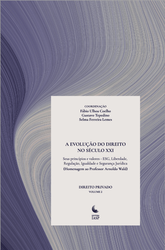
🌐follow Marie-Anne Frison-Roche on LinkedIn
🌐subscribe to the Newsletter MAFR Regulation, Compliance, Law
____
► Full Reference: M.-A. Frison-Roche, "Compliance, the new legal way for human values: towards an Ex Ante Responsibility", in Evolução do Direito no século XXI. Seus princípios e valores: ESG, Liberdade, Regulação, Igualdade e Segurança Jurídica. Homenagem ao Professor Arnoldo Wald, vol. 2, Direito Privado, São Paulo, Editora IASP, 2022, pp. 977-983
_____
► Summary of the article: For the first time, the future is the first question for the Humanity. The classical legal conception of Tort Law concerns the Past, the philosophical conception of Hans Jonas, a Responsability for the Future, an Ex-Ante Responsability must become a legal notion.
Traditionally, the Legislator takes decision for the Future and the Judges takes ones for the Past, but now in front of the possible disparition of human beings on this planet, global and catastrophic perspective, all legal perspectives need to be used, breaking the classical repartition, in the priority of the future. To do something, the Responsability must be put on everyone in a legal force, not only on the classical subject of Law and because of past behaviors, but because the operators, States, firms, or individuals, are "in position" to do so.
This new "Ex-Ante Responsability" is an essential part of the Compliance Law, very new branche of Law, with an extraterritorial effect, to find immediate and active solutions for the future. Because the issue is global, international Arbitration is in position to apply the conception, because international arbitrators are the global judges.
This new conception of legal Ex-Ante Responsability, declared by courts, expressed human values, such as the concerns for the others, in concordance withe the humanist tradition of European and American Law, Compliance being not at all to obey regulations but to concretise an alliance a Monumental Goal, here for the preservation of human beings in the future, and the powers and the legal duties of corporate and people to do so.
____
________
Updated: Sept. 1, 2022 (Initial publication: Oct. 14, 2021)
Thesaurus : Doctrine

► Full Reference: L. Rapp, "Conformité, proportionnalité et normativité" ("Compliance, proportionality and normativity"), in M.-A. Frison-Roche (ed.), Les Buts Monumentaux de la Compliance, coll. "Régulations & Compliance", Journal of Regulation & Compliance (JoRC) and Dalloz, 2022, p. 177-198.
____
📕read a general presentation of the book, Les Buts Monumentaux de la Compliance, in which this article is published
____
► Summary of the article (done by the Author): Proportionality is to the exercise of powers what subsidiarity is to the exercise of competences: an indicator as well as a limit. It determines the scope and allows for control at the same time. It sets the standard, before being a standard itself. This may explain why, in principle, it is part of the judge's office and his methods of assessment. But a study of its recent evolution shows that it is gradually moving from the ex-post to the ex-ante, which makes it possible to anticipate that it will soon become an effective tool of compliance policies and a useful normative reference. The article developments demonstrate this, by explaining how one slides from the principle of proportionality to proportionality control, from proportionality control to proportional reasoning, from proportional reasoning to compliance control, and finally, in a last desirable evolution, from compliance control to the necessary proportionality of control.
________
July 6, 2022
Thesaurus : Doctrine
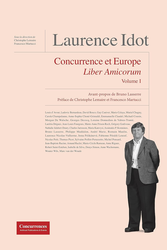
► Référence complète : C. Lemaire & F. Martucci (dir.), Liber Amicorum Laurence Idot. Concurrence et Europe, vol. I, préf. C. Lemaire & F. Martucci, avant-propos B. Lasserre, Concurrences, 2022, 500 p.
____
____
____
► Résumé de l'ouvrage (fait par l'éditeur) : "La carrière de Mme le Professeur Laurence Idot appelle un hommage. Sa pensée a mûri le droit de la concurrence, tant par ses écrits que ses enseignements ou son activité à l'Autorité de la concurrence. Aucun de ses anciens collègues ou étudiants n'est resté insensible à sa finesse d'esprit et sa personnalité exceptionnelle. L'impact de sa pensée, de son enseignement et de ses consultations justifie que, dans la plus pure tradition universitaire, des Mélanges lui soient dédiés.
Théoricienne confrontée à la réalité des dossiers, Laurence Idot a marqué la recherche par son analyse fine et habile des interactions entre le droit de la concurrence, le droit de l'Union européenne, et le droit de l'arbitrage et le droit international. A l'heure du développement des recours à l'arbitrage international et de la croissance du droit européen de la concurrence, ses écrits et sa compréhension du droit conservent leur actualité.
L'originalité du parcours du Professeur Idot tient aux chemins qu'elle a tracés dans des droits en développement : le droit européen d'un côté, le droit de la concurrence de l'autre - auxquels elle a chacun consacré une revue. Les destins de Concurrence et Europe sont désormais entremêlés.".
____
📝lire l'article de Marie-Anne Frison-Roche : "L'appui du Droit de la Compliance pour la maîtrise quotidienne du Droit de la concurrence"
________
July 6, 2022
Thesaurus : Doctrine

► Référence complète : L. d'Avout, "L'arbitrabilité sous condition : réflexions au départ de l'antitrust", in C. Lemaire & F. Martucci (dir.), Liber Amicorum Laurence Idot. Concurrence et Europe, vol. I, préf. C. Lemaire & F. Martucci, avant-propos B. Lasserre, Concurrences, 2022, pp. 177-192
____
► Résumé de l'article (fait par l'auteur) : "À travers l'arbitrabilité, l'on répond en principe de façon binaire à la question de l'admissibilité du règlement privatisé d'un litige. Ce concept juridique permet-il également de restreindre les marges de manœuvre des arbitres internationaux dans l'exercice de leur mission juridictionnelle, par une admission de l'arbitrage subordonnée au respect d'un régime juridique donné (loi étatique, convention internationale, etc.) ? Une réponse positive peut être formulée dans certains cas, moyennant l'étude des liens entre la règle d'arbitrabilité et le contrôle étatique subséquent des sentences arbitrales. Lorsque le contrôle de compatibilité des sentences est effectué non seulement au regard de principes mais aussi de certaines règles internationalement impératives, telles celles du droit de la concurrence, l'on peut conclure en amont à la subordination de l'arbitrabilité du litige au respect de ces règles. Une corrélation ou un lien causal, apparaît ainsi (ou est susceptible d'apparaître), dans certains secteurs économiques sensibles, entre la définition par les collectivités publiques des litiges susceptibles d'être arbitrés, l'encadrement consécutif de la mission du juge privé choisi par les parties et le contrôle, ultérieur par les juges étatiques, de l'admissibilité du produit de cette justice privée. Ce lien causal exprime une arbitrabilité de type conditionnel qui, loin de fragiliser le règlement privatisé des litiges internationaux, oeuvre au contraire à l'insertion cohérente de l'arbitrage dans le système plus général du contentieux transnational.".
____
🦉Cet article est accessible en texte intégral pour les personnes inscrites aux enseignements de la Professeure Marie-Anne Frison-Roche
________
March 31, 2022
Thesaurus : Doctrine

► Full Reference: E. Silva-Romero & R. Legru, "What place is there for compliance in investment arbitration?", in M.-A. Frison-Roche (ed.), Compliance Jurisdictionalisation, Journal of Regulation & Compliance (JoRC) and Bruylant, coll. "Compliance & Regulation", to be published.
____
📘read a general presentation of the book, Compliance Jurisdictionalisation, in which this article is published
____
► The summary below describes an article that follows an intervention in the scientific manifestation Compliance et Arbitrage, co-organised by the Journal of Regulation & Compliance (JoRC) and the University Panthéon-Assas (Paris II). This conference was designed by Marie-Anne Frison-Roche and Jean-Baptiste Racine, scientific co-directors, and took place in Paris II University on March 31, 2021.
In the book, the article will be published in Title III, devoted to: Compliance et Arbitrage.
____
► Summary of the article: The authors emphasize the new and growing place of Compliance in International Arbitration, particularly in the requirement of respect for ethical values, since arbitrators can implement Ethics, sometimes lacking in international trade, or even must put their power only at the service of investors who respect the Rule of Law.
Thus, Compliance is deployed through the classic control by the arbitrators of the legality of the investment, which applies both to the establishment of the treaty itself and to the investor. In a more recent way, the arbitrator can control about an investment project a sort of "social license to operate" of the investor, concept related to the social responsibility of the companies, appeared for the protection of the peoples indigenous. Moreover, Compliance can justify a substantial assessment by the arbitrator of the effective respect of the human rights and the environment protection via an investment treaty, the State party remaining able to act for the effectiveness of these concerns.
____
🦉This article is available in full text to those registered for Professor Marie-Anne Frison-Roche's courses
________
March 29, 2022
Conferences
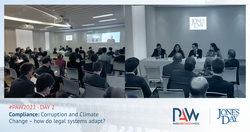
 ► Full reference: Frison-Roche, M.A., The part of Compliance Law in the fight against Corruption and Climate Change, in Paris Arbitration Week (PAW), Compliance: Corruption and Climate Change - how legal systems adapt?, Jones Day, March 29, 2022.
► Full reference: Frison-Roche, M.A., The part of Compliance Law in the fight against Corruption and Climate Change, in Paris Arbitration Week (PAW), Compliance: Corruption and Climate Change - how legal systems adapt?, Jones Day, March 29, 2022.
Debate with Mathias Audit coordinated by Claire Pauly, Vice-President of the Paris Arbitration Week.
____
► Presentation of the intervention: After the presentation made by Mathias Audit of the consideration of facts of corruption, notably by the red flags method, in an arbitration trial, it seems a low-performing system of proof in compliance: the more diligent a party is in showing that it tried to meet its compliance obligations, the more it is exposed to demonstrating its own failure to doing so. It seems a perversity … Therefore, I can understand why companies often so dislike Compliance Law because more they make efforts, more they put money and more they are punished…
But this representation is not totally exact.
My first observation is about the definitions themselves. It is particularly important to have a precise definition of “compliance obligations”, to not confuse them with obligations coming from Criminal Law. The confusion between Criminal Law and Compliance Law is frequent, maybe because what Compliance Law want to eradicate is also prohibited by Criminal Law, for instance corruption. Indeed, technically criminal legal rules and compliance legal rules have many points of contacts, but they are not the same: the obligations are different, the legal persons obliged are different, the reasoning are different the purposes are different.
Because the general definition of Criminal Law and Compliance Law are different. Criminal Law, very old branch of Law, which prohibits and sanctions corruption, does it for everyone because the singular behavior is wrong (to corrupt; to be corrupted). Compliance Law is a very new branch of Law, is a systemic branch of economic Law, which wants to eradicate in the future mechanisms because they destroy economic systems, such as corruption does. Its wants that not to protect moral values but to protect economic systems. Therefore, Compliance Law asks some entities, large companies, to do something only because they are in position to do so: to detect and to prevent this corruption, in order to obtain in the future, the protection against this systemic risk threating the economic systems. The compliance legal tools are more in Ex Ante than in Ex Post: risk mapping, audit, code of conduct, training, obtention of information through the chains of suppliers.
The proof to give is not the non-corruption everywhere from everyone but this concrete action of prevention and education, companies being entities helping public authorities in this global fight.
More precisely, in this definition Compliance Law is not the general obligation to obey the regulations applicable (because this is simply the definition of Law itself, applicable to everybody). Compliance Law is a very new branch of Law which exists only for some systemic “global policies” (as the title of your manifestation says) applicable only on systemic entities (large companies) in a global perspective: for instance, fighting corruption, fighting money laundering, fighting climate change, fighting discrimination between human beings.
In your example, for fighting corruption, specific legal obligations are taken, such as FCPA (with extraterritorial effects) or in French legal system the so-called the 2016 “Sapin 2” Law. These obligations don’t concern everybody: they concern entities in position to do so: large companies.
My second remark is about the burden of proof. These compliance obligation or compliance duties are obligations of means. Companies are obliged to adopt Compliance plans, organize risk mapping, and so on. A lot of them organize them through code of compliance, or code of ethic, or code of corporate social responsibility, because Compliance Law is in an intimacy with Corporate Law. Because Compliance Law is a very concrete branch of law, these disposals are adopted at the level of the group and replicated in the contracts with suppliers.
But he success of these compliance tools is only an obligation of means. For instance the supervisory authority does not require the company to have seen all the risks, in their existence or their exact quantification. In this sense, about money laundering, the French Financial Markets Authority said that the setup of these compliance tools must be “effective”, but after that the company must only do its “best efforts” to aim an “efficient” result (obligation de moyens). The French Regulatory Authority for the digital space says the same about the eradication of speeches of hate that Compliance Law oblige digital companies to fight (using the term of obligation de moyens).
Moreover, about corruption, the Commission of sanction of the French Anticorruption Agency said in a decision of July 2019 that the firm is free to choose the technics to detect and to prevent the corruption (confirming that Compliance is not just following what the Regulator says), but offered a legal certainty: if the company just follows what the Regulators had said in its guideline (rule based compliance behavior), it is no more possible to punish it.
My third remarks could be a proposal for a more efficient system of proof. It is true that the burden of proof is on the company’s shoulders. But the object of proof is not the absence of corruption (it would not be possible…). The object of proof is the existence of due diligence to detect and prevent corruption.
Companies must prepare that, must constitute these proofs by advance. “Due diligence” is a legal concept frequently used in Compliance Law. Regulators, supervisors, and courts ask companies to show the reality of these diligences. It would not be sufficient to present the cost of Compliance… It will be sufficient to show the effectivity of Compliance programs freely adopted, taking in consideration the guidelines released by public authorities.
Public authorities say they want to help companies to diffuse an effective “culture of compliance” : a dialogue with civil and corporate courts, not only with criminal courts would be efficient, for instance for the protection of human rights.
In a second part of this debate, on Climate change and Compliance, Claire Pauly asked the question: "My question is two-fold: do you consider that climate change issues should be treated in the same way as corruption issues? And do you think that arbitrators are well suited to tackle those issues, by upholding the method applied to determine and demonstrate corruption issues?".
The response has been:
Firstly, on the technical similarity between fighting Corruption and fighting Climate Change in Compliance Law, it is the same perspective effectively.
If we come back to the definition of Compliance Law, the Compliance tools are organized to obtain in the future systemics results, such as no more corruption, no more money laundering, what we can name “Monumental goals”. This is a political decision: to design the future for excluding some systemic catastrophes. Corruption is an example of systemic risk; but climate change is another one.
Fighting against Climate Change is a Monumental Goal, of the same nature than fighting Corruption.
As everyone knows, we suffer of a lack of tools to address one of this fundamental challenge of our times which is climate change (more difficult than corruption...). But we are lucky to have some Compliance legal tools: we need to use them, because we have so few techniques about this Climate issue…
And Compliance Law is the more adequate branch of Law because it is an Ex-Ante branch of Law : generally, its obligations are on the future, and the Climate change drama is in the future also.
We can already see that Compliance Law is applicable to Climate Change issue
It is easy to see it through the legal techniques.
In the French legal system, the Sapin 2 law invented in 2016 some new compliance techniques, such as risk mapping, audit, due diligence, to detect and prevent corruption.
One year after, in 2017, the so-called Loi Vigilance took the same techniques, copying exactly the legal dispositions of Sapin 2 in this law to oblige large companies to detect and to prevent violation of human rights and environmental obligation, not only inside the corporate group but also through the supply chains. The manager will be accountable for that.
On February 23, 2022, the European Commission adopted a proposal for a European Directive in the same direction of a “global policy” to impose a “corporate sustainability due diligence” on large companies, notably for fighting climate change. This new text will be effective in two years in the Internal legal systems.
By a rules-based analysis and a principle-based analysis, we can see this is the same reasoning.
Of course, this “corporate sustainability due diligence” is only an obligation of means.
But it is extremely ambitious, linked to the direct consideration of the Corporate Social Responsibility.
And I guess it will be efficient because all these tools are not only Ex Post but also Ex Ante: when the issue is to exclude the catastrophic perspective of the disappearance of the humankind on our planet, having Compliance Law, this Ex-Ante branch of law, is so precious!
Secondly, about the role of Arbitration in this issue, I am tempted to say: everyone is required in this global crucial policy!
It is quite difficult for a national court to decide on this sort of issue because Climate change is a global issue, while arbitrators are global judges.
Technically it is necessary and technically possible that Arbitration takes its place, because these due diligences about detection, prevention, action for a better Climate balance are organized non only in corporate mechanisms, such as code of conduct, corporate commitments, or manager remuneration calculation, but also a lot of contractual dispositions.
We will see a lot of new legal techniques: a lot of international public global policies will be adopted. The obligation to give information about that not only to investor but also to stakeholders will be adopted worldwide. The technique of “compliance by design” will be used on the corporate policy of fighting against Climate change.
Meanwhile, the classical branch of law, were Compliance Law steps in, will remain active, such as International Law, Corporate Law, Tort Law Contract Law, where Arbitration is so central.
So, in short, your question was: are Arbitrators able to deal with climate change issue? my response is: “oh, yes!”
____
► Read the repport made by the fait par la Paris Week of Arbitration ( on the distinction between Compliance Law and Criminal Law, and their articulation)
____
Pour aller plus loin⤵️
📘Frison-Roche, M.-A. (ed), Compliance Monumental Goals, 2022.
📘Frison-Roche, M.-A. (ed), Compliance Jurisdictionalisation, 2022.
________
Nov. 10, 2021
Thesaurus : Doctrine
Référence complète : Pineda Rios, D., Le Droit de la compliance, un pivot transformateur de l'arbitrage international. L'annulation de sentences arbitrales pour non-respect des droits humains et de l'environnement, mémoire Master, Paris I, 2021.
Daniela Andrea Pineda Ríos
March 31, 2021
Conferences

 Full reference: Frison-Roche, M.-A., Compliance et arbitrage. Rapport de synthèse: un adossement (Compliance and Arbitration: a Backing. Conclusion), in Frison-Roche, M.-A. & Racine, J.-B., Compliance et Arbitrage (Compliance and Arbitration), Colloquium co-organised by the Journal of Regulation & Compliance (JoRC) and the Centre de recherches sur la Justice et le Règlement des Conflits (CRJ) of Panthéon-Assas University (Paris II), with the support avec the International Court of Arbitration, Paris, 31st of March 2021
Full reference: Frison-Roche, M.-A., Compliance et arbitrage. Rapport de synthèse: un adossement (Compliance and Arbitration: a Backing. Conclusion), in Frison-Roche, M.-A. & Racine, J.-B., Compliance et Arbitrage (Compliance and Arbitration), Colloquium co-organised by the Journal of Regulation & Compliance (JoRC) and the Centre de recherches sur la Justice et le Règlement des Conflits (CRJ) of Panthéon-Assas University (Paris II), with the support avec the International Court of Arbitration, Paris, 31st of March 2021
_____
Read the program of this colloquium
See Marie-Anne Frison-Roche's conclusion in video (in French, with English subtitles)
These notes of the conclusion have been written as the colloquium took place.
See the video of the entire colloquium (in French, with English subtitles)
___
This colloquium is part of the Cycle of colloquium 2021 organized by the Journal of Regulation & Compliance (JoRC) and its partners around the topic Compliance Juridictionnalization.
This manifestation is in French but the interventions will be the basis for a specific chapter of the English collective book directed by Marie-Anne Frison-Roche, Compliance Juridictionnalization, co-published by the JoRC and Bruylant.
An equivalent book in French, La Juridictionnalisation de la Compliance, directed by Marie-Anne Frison-Roche, will be co-published by the JoRC and Dalloz.
Read the notes established for the conclusion below ⤵️
Updated: Jan. 14, 2021 (Initial publication: Dec. 14, 2020)
Conferences

► Full Reference : Frison-Roche, M.-A., The Economic Attractiveness of Impartiality ("L'attractivité économique de l'impartialité"), in ""Economic Attractiveness, Judge Office and Impartiality. Thinking the judge Office" ("L'attractivité économique, l'office du juge et l'impartialité. Penser l'office du juge"),
____
🎥 watch the conference (in French with English subtitles)
____
📝 read the colloquium program ( in French)
📝 see the general program of the cycle on the Judge Office.
____
📝 read François Ancel's article of 14th of January 2021 in the Receuil Dalloz and which report this colloquium (in French)
📝 read the Working Paper, basis of this conference.
This Working Paper is significantly different from the conference because it was conceived befor the colloquia cycle beginning. In addition, since this manifestation was a Round Table, the conference has taken more into account previous conferences and what said the other two speakers.
📊 see the slides, basis of the conference (in French)
The slides could not be shown during the conference. Orally, it was appropriate to more develop the introductory remarks for emphasizing the human and unique dimension of the Judge Office, expected in economic matters. As a result, the second part of the conference was not given orally, so slides therefore remain the only media available.
____
► Summary of the conference : To fit into the ambition of this general colloquia cycle, which is to "Think the Judge Office" and in this round table which apprehends the imperative of economic attractiveness of this office, firstly emerges the seemingly contradictory relationship between this imperative and the distance that the judge must maintain. Thus it is often asserted that the judge should be internalized at this point in the "places", - an economic concept of great scope (to which the first part of the introduction is devoted, defining the "place" at the same time as a closed and porous space and as a "systemic litigant" -, that he/she should ipso facto lose his/her distance, that is to say his/her impartiality. As places are in competition, even if weighing on one hand the effectiveness of the place, and on the other hand the impartiality of a judge who is external to this place - Judge referring to the Law , Impartiality would necessarily emerge weakened. It would then be necessary on a case-by-case basis to get the judge to give the desired concessions...
The conference aim is to take the opposite position and to state that the Place - in particular because they must be strongly distinguished from the Markets, of which they were the ancestors - require a Judge, who is at the same time "singular", that is to say with a personality, a face, opinions, and in distance so that his/her imagination does not surprise Place. Indeed, these require a human Justice, and a not mechanical one and singular judges, of whom the juge des référés or the arbitrator are the epigone, meets this need. But for reducing their "margins of discretion", how Economy qualifies the Impartiality of a person who can never be neutral, the singular Judge's Office must be inserted into mechanisms reducing these margins. In this way, the Place may reach a Judge who is always more impartial, and in doing so the Place becomes always more attractive.
To achieve this in practice, the place expresses two legitimate expectations, as a "systemic litigant", whose satisfaction increases and the singular Judge's Impartiality and increases the Attractiveness of the Place as a space. This clearly shows that the Place's Attractiveness and the Judge's Impartiality, because judges are inserted into procedures, into institutions and into a "jurisdictional family", are not only not contradictory, but are on the contrary convergent, one fueling the other.
Concretely, and judicial practice shows it, it is necessary to consolidate the particular Judge's Impartiality by inserting him/her into collective processes. As it is necessary to promote a radiance of Impartiality by strengthening the "jurisdictional family".
To consolidate the singular Judge's Impartiality by inserting him/her into collective processes, it is necessary to admit without hesitation the subjectivity of the judge, to seek it even. The reduction of the margins of discretion, definition of impartiality, being obtained by the inclusion of the judge in a procedure of which he /her alone is the master but in which he/her is not alone. This has the technical consequence that he/her is himself/herself in an adversarial debate, not only during the proceedings, but also before (in the media), inside the judgment (and the decision of the Criminal Chamber of 25 November 2020 is a model of that) and after the judgment. By that, the Judge shows that by his/her office he/she is in the future, as climate justice will show. In addition, to limit his/her margins of discretion, the singular judge must fit into a rational principle of coherence, vertical and horizontal. Vertical coherence, because he/she integrates what it is said and the technique of the "determining opinion" is to be encouraged, the singular judge having to avoid it only if he/she has "strong reasons" to do it. This is to follow this general rule Comply or Explain (which is the very opposite of blind obedience). Horizontal coherence, because the singular judge either sticks to what he/she said, estoppel also being a rule of logic. But above all, the institution must extract as much as possible from " institutional doctrines", by all means, of which the annual reports are an example.
To consolidate the singular Judge's Impartiality by strengthening the notion and reality of the "Jurisdictional Family", it is necessary to have of it a broader conception, which could lead to "guidelines" common to various jurisdictions, and a stronger one, by integrating those surrounding the judge to lead to judgment. In this, the procedure before the Court of Justice of the European Union, working on a common file, is a model. If this community were even stronger, the Judge Office would be even more useful than it is already in the digital space.
Thus, Judges who are always human, always diverse, always singular, who listen, consider and adjust to the situation, who within a Jurisdictional Family fit into an Institutional Doctrine which transcends and supports them but which they transform if there is a strong reason to do so, a reason always expressed said: this is the embodied Impartiality that makes an economic and financial Place attractive.
________
Nov. 12, 2020
Thesaurus : Doctrine
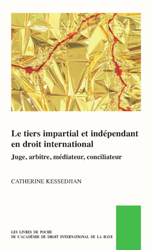
Full reference: Kessedjian, C., Le tiers impartial et indépendant en droit international. Juge, arbitre, médiateur, conciliateur, Académie de Droit international de La Haye, 2020, 769p.
Read the forth of cover (in French)
Read the table of content (in French)
Feb. 17, 2015
Interviews

L'arrêt de la Cour d'appel de Paris, saisie d'un recours en révision, est attendu pour le début de l'après-midi.
Le recours en annulation de la sentence arbitrale prononcée en faveur de Bernard Tapie contre le CDR a été rejeté par un arrêt précédant de la Cour d'appel, du fait d'une prescription de l'action.
Le recours en révision pourrait être déclaré recevable du fait d' "éléments nouveaux", condition de recevabilité de ce type de recours.
Ces "éléments nouveaux" pourraient être puisés par le juge civil (ici la Cour d'appel de Paris) dans le dossier en cours d'instruction par les magistrats dans l'instance pénale par ailleurs en cours.
Si l'action en révision est déclarée recevable, ce qui est un premier point, l'enjeu crucial est alors le suivant.
Soit, et c'est une question de fond, l'article est qualifié par la Cour d'appel de Paris, d' "arbitrage interne", ce qui autorise la Cour de statuer au fond sur le litige qui oppose depuis des années le groupe Tapie au Crédit Lyonnais. Mais cette qualification n'est en rien acquise.
En effet, le Code de procédure civile et la jurisprudence qualifie d' "arbitrage international" tout arbitrage qui met en cause les "intérêts du commerce international". Or, les titres cédés (les titres de la société Adidas) ne sont pas français. Les sociétés qui ont été utilisées pour le montage ne sont pas françaises. Seul le contrat de mandat donné à la banque ramène à des intérêts de droit français. Cela peut-il suffire à rendre l'arbitrage de "droit interne" ?
Si cela ne l'était pas, et beaucoup en doute, alors si les éléments sont suffisants pour ouvrir une révision qui anéantit la première procédure d'arbitrage, parce que l'arbitrage serait de nature internationale, la Cour d'appel de Paris ne pourrait pas pour autant statuer sur le fond.
Il faudrait alors que le Tribunal de commerce de Paris désigne de nouveaux arbitres. Une demande en ce sens a déjà été formée devant lui. Il a pour l'instant sursis à statuer.
Sauf à ce que la Cour d'appel de Paris, par exemple pour la bonne administration de la justice, pour des raisons d'ordre public économique, pour la protection de la place arbitrale de Paris, décide d'évoquer l'affaire, selon les principes généraux de la procédure. Pourquoi pas.
Feb. 17, 2015
Blog

À affaire célèbre, arrêt fameux.
Rendu le 17 février 2015, l'arrêt de la Cour d'appel de Paris dans ce qu'il est convenu d'appeler "l'affaire Tapie" était très attendu.
On se souvient que la sentence arbitrale du 7 juillet 2008 a estimé que lors de la cession des titres de la société Adidas, le Crédit Lyonnais avait commis des fautes dans le conseil qu'il devait au vendeur, le groupe Tapie, octroyant en conséquence une indemnisation à celui-ci pour un montant élevé.
Le CDR, structure privée de defeasance adossée à l'EPFR, structure de l'État, avait tenté plusieurs types de recours contre la sentence, dont un recours en révision. Pour réussir, celui-ci doit s'appuyer sur des "éléments nouveaux et déterminants". En outre, s'il s'agit d'un arbitrage interne (et non pas d'un arbitrage international), la Cour d'appel de Paris si elle accueille une telle voie de recours peut décider de se substituer au Tribunal arbitral et connaître de l'affaire au fond.
Le reste de l'arrêt peut paraître factuel, le dossier civil étant largement alimenté par le dossier pénal, puisque désormais une instance pénale en cours n'oblige plus le juge civile à suspendre le cours du procès qui se déroule devant lui et lui permet au contraire de puiser dans le premier dossier .
L'on se demande ainsi si l'on ait enfin à la fin de l'histoire. Ainsi en est-il de l'obligation ou non de Bernard Tapie de rembourser immédiatement les fonds reçus. Sans doute, puisque les parties sont remises en l'état du fait de la rétractation de la sentence. Dès lors, il lui faut bien rendre ce qu'il est censé n'avoir jamais reçu. Mais parce que l'arrêt ne lui ordonne pas expressément, ne va-t-il pas opposer une inertie contraignant les demandeurs à soit solliciter de la Cour une interprétation de son arrêt soit aller devant le juge de l'exécution ?
Mais l'arrêt contient également une discussion juridique de fond. En effet, suivant que l'arbitrage est "interne" ou "international", les règles de droit changent. C'est pourquoi les parties se sont beaucoup disputées à ce propos. La Cour d'appel de Paris choisit de qualifier l'arbitrage d' "arbitrage interne" : bien joué, puisque cela lui permet de trancher le litige au fond après avoir rétracté la sentence au titre de l'action en révision.
Mais la qualification est un art juridique contrôlée par la Cour de cassation. Après une longue évolution jurisprudentielle, le Code de procédure civile a fini par qualifier l'arbitrage international par l'objet sur lequel il porte : un "intérêt du commerce international". Est-ce le cas en l'espèce ?
Updated: July 31, 2013 (Initial publication: Oct. 4, 2011)
Teachings : Les Grandes Questions du Droit, semestre d'automne 2011

May 22, 2013
Publications
Référence complète : Frison-Roche, Marie-Anne, Affaire Tapie : un arbitrage juridiquement prudent, Slate, 22 mai 2013.
Jan. 25, 2005
Publications
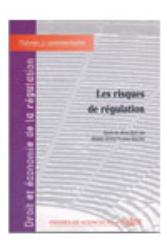
► Référence complète : M.-A. Frison-Roche, "Arbitrage et droit de la régulation", in M.-A. Frison-Roche (dir.), Les risques de régulation, série "Régulations & Compliance", coll. « Droit et Economie de la Régulation », t.3, Dalloz/Presses de Sciences Po, 2005, pp.223-240.
Cet article a été également publié dans l'ouvrage Le contrat d’arbitrage, éd. Légis, 2005, pp.323-33.
___
► Résumé de l'article : xxx
____.
📝 lire l'article
____